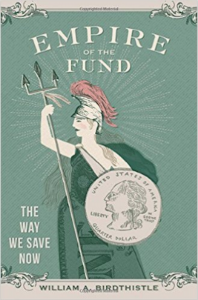The following is a guest post is by Professor William Birdthistle, author of the new book, “Empire of the Fund: The Way We Save Now“. You can find out more about Professor Birdthisle and his book at EmpireOfTheFund.com.
Empire of the Fund is an examination of the way we save now. For a video précis of the book, here is a short trailer:
Over the past thirty years, America has embarked on a grand experiment – perhaps the richest and riskiest in our financial history – to change the way we save money. The hypothesis of our experiment is that millions of ordinary, untrained, and busy citizens can successfully manage trillions of dollars in a financial system dominated by sophisticated investments firms – firms that on many occasions have treated investors shabbily.
As ten thousand baby boomers retire from the workforce each day and look to survive for almost two decades largely on the mutual funds in their individual accounts. We will soon learn whether our massive experiment has been a success. And if not, we will soon also discover just how large the costs of failure will be.
Three Solutions to Save Our Savings – Empire of the Fund
The End of Pensions
 A generation ago, large numbers of Americans enjoyed the support of pensions offered by their employers. Pensions, of course, guarantee their beneficiaries a steady stream of payments from their retirement until their death. Together with the benefits of Social Security, pensions provided secure retirements to millions of working Americans. The golden age of the pension, however, is effectively over. And it may never have been all that gilded, as not once in the past thirty-five years did more than 40% of American workers ever participate in such a plan.
A generation ago, large numbers of Americans enjoyed the support of pensions offered by their employers. Pensions, of course, guarantee their beneficiaries a steady stream of payments from their retirement until their death. Together with the benefits of Social Security, pensions provided secure retirements to millions of working Americans. The golden age of the pension, however, is effectively over. And it may never have been all that gilded, as not once in the past thirty-five years did more than 40% of American workers ever participate in such a plan.
Today, the benefits of Social Security and pensions are alarmingly inadequate. The average monthly benefit for retirees from Social Security is now $1,335, or just over $16,000 per year. Pensions, meanwhile, have rapidly disappeared from our economic ecosystem: public pensions are underfunded by trillions of dollars, and the number of U.S. private-sector workers covered solely by pensions has fallen to just 3%.
Americans in the future will have to support themselves far more on the success or failure of their personal investment accounts.

